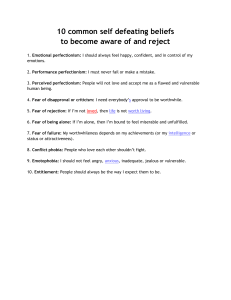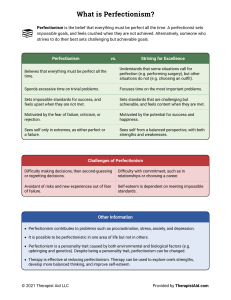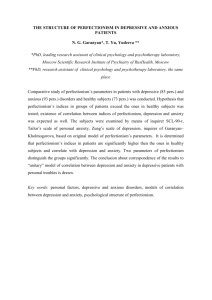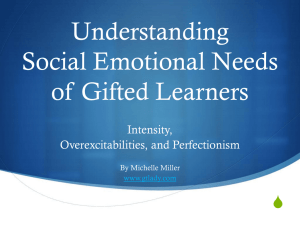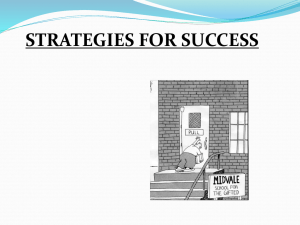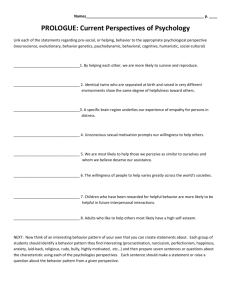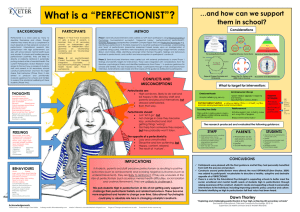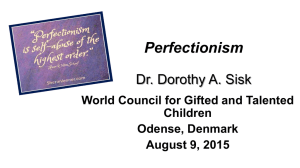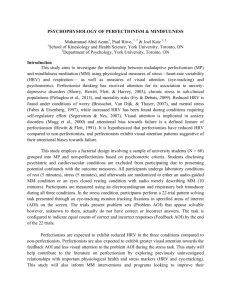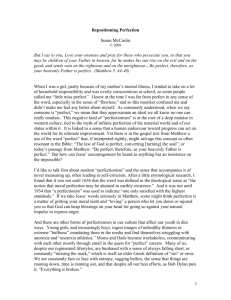Multidimensional Perfectionism Scale
advertisement
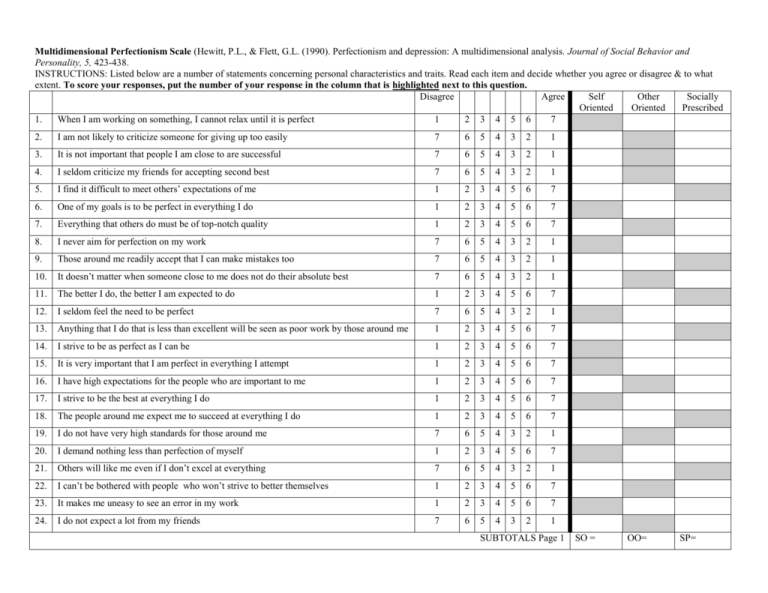
Multidimensional Perfectionism Scale (Hewitt, P.L., & Flett, G.L. (1990). Perfectionism and depression: A multidimensional analysis. Journal of Social Behavior and Personality, 5, 423-438. INSTRUCTIONS: Listed below are a number of statements concerning personal characteristics and traits. Read each item and decide whether you agree or disagree & to what extent. To score your responses, put the number of your response in the column that is highlighted next to this question. Disagree Agree Self Other Socially Oriented Oriented Prescribed 1. When I am working on something, I cannot relax until it is perfect 1 2 3 4 5 6 7 2. I am not likely to criticize someone for giving up too easily 7 6 5 4 3 2 1 3. It is not important that people I am close to are successful 7 6 5 4 3 2 1 4. I seldom criticize my friends for accepting second best 7 6 5 4 3 2 1 5. I find it difficult to meet others’ expectations of me 1 2 3 4 5 6 7 6. One of my goals is to be perfect in everything I do 1 2 3 4 5 6 7 7. Everything that others do must be of top-notch quality 1 2 3 4 5 6 7 8. I never aim for perfection on my work 7 6 5 4 3 2 1 9. Those around me readily accept that I can make mistakes too 7 6 5 4 3 2 1 10. It doesn’t matter when someone close to me does not do their absolute best 7 6 5 4 3 2 1 11. The better I do, the better I am expected to do 1 2 3 4 5 6 7 12. I seldom feel the need to be perfect 7 6 5 4 3 2 1 13. Anything that I do that is less than excellent will be seen as poor work by those around me 1 2 3 4 5 6 7 14. I strive to be as perfect as I can be 1 2 3 4 5 6 7 15. It is very important that I am perfect in everything I attempt 1 2 3 4 5 6 7 16. I have high expectations for the people who are important to me 1 2 3 4 5 6 7 17. I strive to be the best at everything I do 1 2 3 4 5 6 7 18. The people around me expect me to succeed at everything I do 1 2 3 4 5 6 7 19. I do not have very high standards for those around me 7 6 5 4 3 2 1 20. I demand nothing less than perfection of myself 1 2 3 4 5 6 7 21. Others will like me even if I don’t excel at everything 7 6 5 4 3 2 1 22. I can’t be bothered with people who won’t strive to better themselves 1 2 3 4 5 6 7 23. It makes me uneasy to see an error in my work 1 2 3 4 5 6 7 24. I do not expect a lot from my friends 7 6 5 4 3 2 1 SUBTOTALS Page 1 SO = OO= SP= Add up in each column the colored areas to create summary score for each dimension Disagree Agree 25. Success means that I must work even harder to please others 1 2 3 4 5 6 7 26. If I ask someone to do something, I expect it to be done flawlessly 1 2 3 4 5 6 7 27. I cannot stand to see people close to me make mistakes 1 2 3 4 5 6 7 28. I am perfectionistic in setting my goals 1 2 3 4 5 6 7 29. The people who matter to me should never let me down 1 2 3 4 5 6 7 30. Others think I am okay, even when I do not succeed 7 6 5 4 3 2 1 31. I feel that people are too demanding of me 1 2 3 4 5 6 7 32. I must work to my full potential at all times 1 2 3 4 5 6 7 33. Although they may not say it, other people get very upset with me when I slip up 1 2 3 4 5 6 7 34. I do not have to be the best at whatever I am doing 7 6 5 4 3 2 1 35. My family expects me to be perfect 1 2 3 4 5 6 7 36. I do not have very high goals for myself 7 6 5 4 3 2 1 37. My parent rarely expected me to excel in all aspects of my life 7 6 5 4 3 2 1 38. I respect people who are average 7 6 5 4 3 2 1 39. People expect nothing less than perfection from me 1 2 3 4 5 6 7 40. I set very high standards for myself 1 2 3 4 5 6 7 41. People expect more from me than I am capable of giving 1 2 3 4 5 6 7 42. I must always be successful at school or work 1 2 3 4 5 6 7 43. It does not matter to me when a close friend does not try their hardest 7 6 5 4 3 2 1 44. People around me think I am still competent even if I make a mistake 7 6 5 4 3 2 1 45. I seldom expect others to excel at whatever they do. 7 6 5 4 3 2 1 Self Oriented Other Oriented Socially Prescribed SUBTOTALS Page 2 Add up in each column the colored squares for each dimension SUBTOTALS from Page 1 SUBSCALE TOTALS SO = OO= SP= Medical Student Averages and Standard Deviations (in parantheses) for Comparison (Henning et al., 1998) Medical students (Enns et al. 2001) 67 (15) 70 (15) 57 (13) 56 (12) 47 (13) 49 (13) Enns, M.W., Cox, B..J., Sareen, J., & Freeman, P. (2001). Adaptive and maladaptive perfectionism in medical students: A longitudinal investigation. Medical Education, 35, 1034-1042. Henning, K.R., Ey, S., & Shaw, D. (1998). Perfectionism, the imposter phenomenon, and psychological adjustment in medical, dental, nursing, and pharmacy students. Medical Education, 32, 456-464. The Multidimensional Perfectionism Scale is not a clinical measure so there is not a clinical cutoff score but the higher you score on each scale, the more unhealthy your perfectionistic attitudes and behaviors may be—especially if you are dealing with a significant stressful event. *Generally, having high self-oriented perfectionism is associated with greater productivity, success in career, and conscientiousness. * Having high other-oriented perfectionism may lead to problems delegating to others, being seen by others as highly critical/judgmental. * Having high socially prescribed perfectionism is associated with greater risk of anxiety, depression and even suicide risk if the person experiences a major setback (perceives others are disappointed/highly critical of their abilities) and is unable to put the criticism in perspective. Researchers and clinicians are finding that there is a subtle distinction between “adaptive vs. maladaptive perfectionism” (e.g., Enns & Cox, 2002). Here are some examples below: Maladaptive perfectionism Inflexibly high standards—often beyond what is expected Fear of failure Focus on avoiding error Sense of self-worth dependent on performance Associated with procrastination Black and white thinking: perfection vs. failure Adaptive Perfectionism standards modified in accordance with situation high standards matched to person’s limitations and strengths striving for success sense of self independent of performance timely completion of tasks balanced thinking An excellent self-help book is: Antony, M. M. & Swinson, R.P. (1998) When perfect isn’t good enough. New Harbinger: Oakland, CA.
